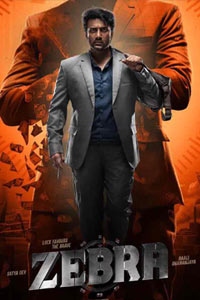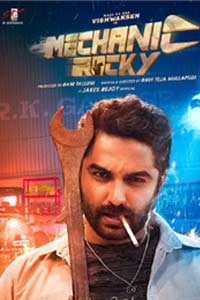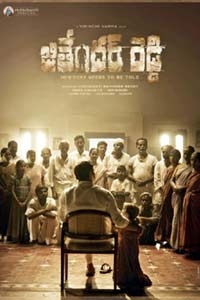
When a film that starts off like a hero-oriented film and moves on to acquire the shade of a crime thriller rested on the strength of the hero's characterization, it is natural to expect more from the second half. Here in 'Asura', the second half traverses a routine trajectory so much so the upright, gutsy, rules-can-be-broken cop voluntarily drops the gun because the one on the opposite side has exhausted bullets. The screenplay seeks to do some magic on the back of dialogues; at one point, the over-indulgence becomes too much to stand, with the self-styled 'rakshasudu' saying, "Dharmanni dhari tappanivvanu." The anti-asuric asura-cop sporadically reveals his poetic side and is a wannabe 'kavi', writing high-sounding poetry for even small fish.
Dharma (Nara Rohit) chases those who escape from the jail like a tiger chases its prey. Charlie (alias name of the villain, played by Ravi Varma) is about to be executed and he has to race against time to escape the hangman's noose. Dharma, who now has to outsmart Charlie's machinations, has his task cut out. It's a battle of mind games between the ruthless cop who would go to any extent to deliver a masterstroke before another bout of poetry and the determined gangster, who won't exchange anything his life for anything.
From a point of projecting the hero as a rebel within the system, the film progresses to a point where human emotions seem all set to be an important element of a fledgling crime thriller. A hero for whom result is more than rules, a villain who stares at death, and a system that has to watch on as the two oppositions play their game. Before the interval bang (when the hero looks helpless, almost), the I-me-myself kind of indulgence gets too much to handle for the audience. It was the court which awarded the villain capital punishment, it was the President who rejected the mercy petition, it was the higher officer who fixed the execution date.. However, it is Dharma who has this song going for him: 'Samharam tappu kadoo.'
There are some sparks that the film throws up. The heated conversation between Dharma and Charlie when the cop intimates the latter about his execution is an intelligent moment. The scene where Charlie directly throws the big challenge at Dharma before being locked up in dark cell is another.
The suspended cop's parallel operation comes with its moments of technical finesse. Good lines are thrown up here and there to add pep to the proceedings. The action choreography passes muster, but what is a big takeaway here is Rohit's intensity and expression.
Priya Banarjee (of KISS and Joru fame) chips in with her glamorous side. The film is so big a crime thriller that it is almost forgotten to have a poem dedicated to her. That is the 'banam' of an idea that is there.
It doesn't make any sense to have villain x telling villain y as to why he is killing him. Things need not be spoon fed especially because such elements have been seen dime a dozen times.
It is again a Nara Rohit film where he is as much different as he as in 'Prathinidhi' and 'Rowdy Fellow'. Take your call. Rohit showed verve in his last two films and which he repeats here, only with an extra, poetic indulgence.
Sai Karthik's music and BGM, and the cinematography give the film an A-rated feel.
Verdict: It's a story of a cop whose life is his message, the message is: Keep rules aside and act. It's a story of a villain whose presence is not required to keep the hero on tenterhooks. A good idea that is executed fairly well.
Rating: 3.25 / 5.0
Showcase your talent to millions!!
Telugu Movie Reviews
 Devaki Nandana Vasudeva
Devaki Nandana Vasudeva
 Zebra
Zebra
 Mechanic Rocky
Mechanic Rocky
 Matka
Matka
 Kanguva
Kanguva
 Jithender Reddy
Jithender Reddy




Comments